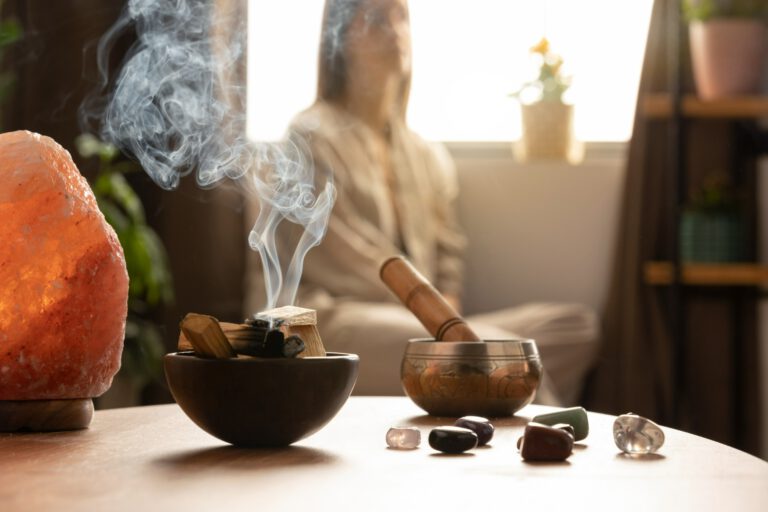In our hectic world, where stress and overwhelm are omnipresent, the millennia-old Indian healing art of Ayurveda offers valuable approaches to restoring balance to body, mind, and spirit. This blog post explores how an Ayurvedic lifestyle can help reduce stress and live more mindfully. From simple daily routines to specific practices like meditation and nutrition, we’ll show you how to incorporate the principles of Ayurveda into your daily life to lead a more balanced life.
Ayurveda Deceleration and Anti-Stress: The Art of Pausing
Modern lifestyles are often characterized by fast-paced activity, multitasking, and constant availability. Ayurveda, on the other hand, teaches us to consciously slow down and appreciate the moment. Ayurveda slowing down and de-stressing means taking time for yourself and focusing on what’s important. This can be achieved through simple measures such as conscious breathing, taking walks in nature, or avoiding excessive screen time. By slowing down our daily routine, we give our nervous system the opportunity to regenerate, thus effectively reducing stress.
A central aspect of Ayurvedic philosophy is the concept of the doshas—Vata, Pitta, and Kapha. These three energies determine our physical and mental constitution. The Vata dosha, in particular, which is associated with movement and change, often becomes unbalanced during times of stress. To calm Vata, Ayurveda recommends regular routines, warm foods, and calming activities such as yoga or meditation.
The Meaning of Dinacharya: Daily Routines for More Balance
An Ayurvedic lifestyle begins with a clearly structured daily routine, known as Dinacharya. This routine helps to create harmony throughout the day and prevent stress. Here are some practical tips you can incorporate into your daily routine:
1. Morning routine: Start the day with a glass of warm water to stimulate the digestive system. A gentle self-massage (abhyanga) with warm sesame or almond oil calms the nervous system and promotes circulation. Follow with 10–15 minutes of meditation or breathing exercises (pranayama) to clear the mind.
2. Diet: Eat according to Ayurvedic principles by choosing fresh, seasonal, and easily digestible foods. For people with high stress levels, warm, cooked meals are ideal, as they calm the Vata dosha. Avoid cold drinks and raw foods in the evening, as these can strain digestion.
3. Sleep hygiene: A regular sleep routine is essential. Go to bed before 10 p.m. and avoid screens for at least an hour before bedtime. A calming herbal tea, such as one with ashwagandha or brahmi, can relax the mind and improve sleep quality.
Durch die Einhaltung solcher Routinen schaffen Sie eine stabile Basis, die Ihnen hilft, den Herausforderungen des Alltags gelassener zu begegnen.
Ayurveda Treatment in Germany: Relaxation On Site
For those who want to delve deeper into the world of Ayurveda, an Ayurveda-Kur in Deutschland offers the perfect opportunity to relieve stress and recharge. At specialized Ayurvedic centers in Germany, you can experience authentic treatments such as massages, herbal applications, and personalized consultations without having to travel far. Such retreats are ideal for detoxifying the body, strengthening the immune system, and calming the mind. Many centers also offer yoga and meditation classes that harmonize perfectly with Ayurvedic practices.
A typical Ayurvedic treatment often includes an individual dosha analysis, followed by tailored treatments. These can range from Shirodhara (a soothing forehead oil treatment) to herbal steam baths. The focus is on restoring dosha balance and reducing long-term stress.
Ayurveda for Detoxification Panchakarma Treatment: Cleansing for Body And Mind
Another important aspect of the Ayurvedic approach is detoxification. Panchakarma at our Ayurveda center in Germany is an intensive cleansing treatment aimed at removing toxins (ama) from the body and restoring natural balance. Panchakarma comprises five main treatments, including vamana (therapeutic vomiting), virechana (purgative purgatives), and basti (medicated enemas). These treatments are individually tailored and performed by experienced Ayurvedic practitioners.
Panchakarma is particularly effective for reducing chronic stress, as it not only cleanses the body but also clarifies the mind. After such a treatment, many people feel refreshed, energized, and mentally clearer. There are now numerous centers in Germany that offer authentic Panchakarma treatments, so you can also experience this profound healing in person.
Meditation And Mindfulness: The Key To Inner Peace
Meditation is a central component of the Ayurvedic lifestyle and a powerful tool for managing stress. Regular meditation helps calm the mind, improve concentration, and promote emotional stability. The practice of Transcendental Meditation or simple mindfulness exercises, in particular, can be easily integrated into daily life.
A simple introduction to meditation could look like this:
- Sit in a quiet place and close your eyes.
- Focus on your breathing without controlling it.
- When thoughts arise, notice them without getting caught up in them and gently return to your breath.
- Start with 5 minutes a day and gradually increase the duration.
Mindfulness also means living in the here and now. This can be fostered through simple actions such as mindful eating, taking a walk, or consciously perceiving sounds and smells. Such practices help free the mind from worries and experience life with more joy.
Ayurveda in Germany: A Growing Movement
The popularity of Ayurveda in Deutschland is steadily increasing as more and more people recognize the benefits of this holistic healing art. From Berlin to Munich, there are now numerous Ayurveda centers, wellness hotels, and practitioners offering authentic treatments. This development demonstrates that Ayurveda is not just an exotic practice, but can be seamlessly integrated into the Western lifestyle.
Many Germans value Ayurveda for its holistic approach, which not only treats physical symptoms but also considers mental and emotional aspects. Whether through courses, workshops, or individual consultations, the opportunities to experience Ayurveda in Germany are diverse.
Practical Tips For Getting Started With The Ayurvedic Lifestyle
If you’re new to the world of Ayurveda, getting started can seem overwhelming. Here are some simple steps to get started:
Adjust your diet: Start by favoring warm, cooked meals and reducing processed foods. Spices like turmeric, ginger, and cumin promote digestion and support well-being.
1. Adjust your Diet: Start by favoring warm, cooked meals and reducing processed foods. Spices like turmeric, ginger, and cumin promote digestion and support well-being.
2. Yoga and Exercise: Incorporate gentle yoga exercises into your daily routine. Even 15 minutes a day can make a big difference.
3. Stress Management: Try breathing exercises such as Nadi Shodhana (alternate nostril breathing) to calm the nervous system.
4. Seek Advice: A consultation with an Ayurvedic practitioner can help you understand your dosha constitution and receive tailored recommendations.
Conclusion: A Mindful Life With Ayurveda
An Ayurvedic lifestyle offers numerous ways to reduce stress and live more mindfully. From daily routines to meditation to specialized treatments like Panchakarma, the principles of Ayurveda are flexible and easily adaptable to modern life. By incorporating small changes into your daily routine, you can gain more balance, energy, and joy in life in the long term.
Whether you’re planning an Ayurvedic retreat in Germany or simply starting a morning routine, every step toward an Ayurvedic lifestyle is a step toward a healthier and happier life. Be inspired by the wisdom of this ancient healing art and discover how it can enrich your life.


